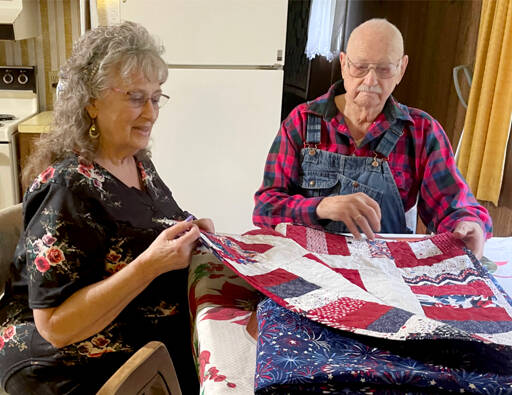PORT ANGELES — Barbara Cason was alarmed but not completely surprised when her father, Arthur Bradow, said he’d been on the roof of his mobile home just off U.S. Highway 101 west of Port Angeles.
The World War II veteran has always preferred to be his own boss and do things himself — whether it was operating his own business or repairing a leaky roof.
Bradow, who turns 100 on Dec. 13, spent three years in the U.S. Merchant Marine and the United States Army Air Forces. The remaining 97 were a lifetime of learning, doing, sharing and not a little dancing.
Bradow was born at home, the second of nine children, in tiny Backus, Minnesota, where his parents ran a dairy farm. There was very little work when he was a teenager during the Great Depression, so he took what he could find. At 16, he got a job harvesting grain for 10 hours a day at 40 cents an hour. Then he milked cows, filling 10-gallon cans of cream for $4.
The U.S. Merchant Marine paid $50 a month, he says, so when his friends started to enlist, he decided to join as well.
That’s how he arrived at the United States Maritime Service Training Station in Sheepshead Bay, N.Y., in 1944 to become an apprentice seaman.
His six-weeks of basic training included knots, line-throwing guns, booms, rigging and piloting.
He learned how to swim in what the service at the time called the “largest enclosed swimming pool in the world.” As he recalls it, lessons consisted of essentially being thrown into it.
Bradow remembers shipping out to the Pacific sometime in March or April in 1945. The war in Europe officially ended on May 8, but the Pacific War would rage on until the Japanese surrender in August.
The U.S. Merchant Marine was the workhorse of naval operations. According to the U.S. Naval Institute, merchant vessels had delivered more than 200,000,000 tons of cargo and carried nearly 10,000,000 troops by the time the war ended.
With cargo loads of fuel, ammunition, food, vehicles and other critical supplies, the often modestly armed merchant vessels were prime targets for attack.
“I worked below deck in maintenance, keeping things clean, changing filters, things like that,” he says.
Bradow served in the Azores, the Caroline and Marshall islands and at Ie Shima during the Okinawa Campaign. It was there that his vessel was hit by an aerial torpedo that blew a 40-by-30 hole in its side.
“We were a mile out when it happened at night around 10 o’clock,” he says. “A couple of Navy tugs on either side held us up.”
He stayed on the vessel for a couple months until he was sent to Pearl Harbor and then finally home. He quit the Merchant Marine and promptly he enlisted in the U.S. Army, only to be diverted to the United States Army Air Forces.
“As we were going through the [enlistment] line, they said, ‘You, and you, and you, and you,’” he says. “They needed people in the Air Force.”
Bradow says he enjoyed his time in the AAF driving a 2½-ton Diamond T Truck and serving on a ground-controlled approach crew that guided aircraft.
It was an easy decision to leave in 1947, though.
“Nah, no money in it,” he says.
After spending a brief period in Washington and then moving to Wisconsin, Bradow, his wife, Leona, and Barbara returned to the state for good in 1958 when they settled in Joyce. He marriage to Leona lasted until her death in 1992.
Bradow’s post-service career suggests there are very few occupations he hasn’t tried and mastered: logger, contractor, truck driver, diesel mechanic, farmer, bartender, janitor and carpenter.
By his estimate he’s built around a dozen homes, from pouring cement to framing to wiring.
“Everything except for the finish work,” he says.
(Not enough patience, Cason says.)
His family threw him an early 100th birthday party Nov. 2 at the Port Angeles Eagles Club, but he’ll celebrate the actual milestone somewhere on the road between Port Angeles and Apache Junction, Ariz. It’s a trip he’s been making since his retirement at 55 (with a short break, because “I got tired of sitting around and went back to work.”)
A member of the American Legion, for 42 years, Bradow says he joined for the dances, not for the meetings.
He is still irked that it wasn’t until 1988 that the Department of Veterans Affairs didn’t grant those who served in the Merchant Marine during World War II veteran’s status and benefit eligibility.
Casualty rates during World War II were much higher for men who served on Merchant Marine vessels than in any other branch of the U.S. armed forces. According to the National WWII Museum in New Orleans, 9,521 of the 243,000 mariners who served in the war were killed — about 4 percent. (The American Merchant Marine at War website reports that 3 percent of U.S. Marines; 2 percent of U.S. Army; 0.9 percent of U.S. Navy and 0.2 percent of Coast Guard service personnel were killed.)
“We couldn’t get medical or anything,” he says. “It’s not really fair.”
On Monday, Bradow plans to drive to 7 Cedars Hotel and Casino for its annual veteran’s appreciation day for a nice meal. But he doesn’t plan to hit the slots.
“Nope, I know better,” he says.
In addition to holding onto your money, Bradow says there are just a few rules for leading a long and healthy life.
“Keep your mouth shut and listen, you’ll learn a lot more.”
“Ask the man upstairs to guide you.”
“Take a teaspoon of apple cider vinegar every day.”
For a man who survived a Japanese torpedo attack and is on his second pacemaker, it’s not bad advice to follow.
________
Reporter Paula Hunt can be reached at paula.hunt@peninsuladailynews.com

